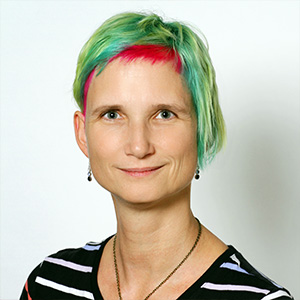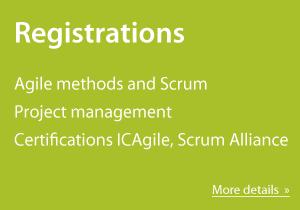

ICP-ACC - ICAgile Certified Professional in Agile Coaching - training in Prague on 17-18 September 2025
Date: 17-18 September 2025
Duration: 2 days
Early bird price: 24 000 CZK plus VAT (21%) valid until 30 days before the start of the training
Regular price: 29 000 CZK plus VAT (21%) otherwise
Place: Prague, Czech Republic
Language: English
Training is delivered by John Barratt accredited ICAgile trainer.
read moreDAO - Certified – Designing Agile Organizations - training in Prague on 17-18 September 2025
Date: 17-18 September 2025
Duration: 2 days
Early bird price: 1 095 EUR plus VAT (21%) valid until 30 days before the start of the training
Regular price: 1 295 EUR plus VAT (21%) otherwise
Place: Prague, Czech Republic
Language: English
Training is delivered by Jurgen De Smet accredited LeSS (Large Scale Scrum) trainer.
read moreJoin our Advanced ScrumMaster and Advanced Product Owner training in April 2025
Join me on confirmed A-CSM Advanced Certified ScrumMaster and A-CSPO Advanced Certified Scrum Product Owner training on April 22-23, 2025 and April 24-25, 2025 respectively in English.
Training will be delivere online (Zoom)
Register here. Looking forward.
read moreVoranc Kutnik - Management 3.0 Workshop in Prague, November 5-6, 2015
Date: November 5-6, 2015
Duration: 2 days
Price: 26 900 CZK excl. VAT
Place: Prague, Czech Republic
Trainer: Voranc Kutnik
Language: English
Voranc - Management 3.0 Licensed Trainer is coming to Prague to deliver this interesting two days workshop.
Management 3.0
Management 3.0 is a workshop, a course, a couple of books, and a collection of concrete practices, to inspire managers and team members, who face the challenge of transforming their organizations to be more innovative, with a higher productivity.
Management 3.0 has 8 major topics, which are continually refined and supplemented. The most important goal for Management 3.0 events is for people to take action to improve their organizations. All events adhere to the following principles: theory and practice in small chunks; clear and effective visuals; inspiring stories and metaphors; fun games and exercises; focused group discussions; and concrete practices with tangible results.
We use original course materials developed by Jurgen Appelo and apply 30 years of combined experience of implementing successful Agile transformation and coaching corporate leaders all over the world. All course participants will receive materials of the course exercises and an official Management 3.0 certificate upon completion this course.
Target Audience
The Management 3.0 course aims at leaders/managers/knowledge workers who want to become Agile, and other stakeholders involved in leadership and management. The course typically draws team leaders, development managers, coaches, scrum masters, project managers, product owners, developers, testers and top-level management.
Management is not only the managers’ responsibility. It is everyone’s job! Management is too important to leave to the managers.
Topics Day 1
Agile management is a new approach to leadership and governance of creative teams and people. You will learn about the contribution of the manager and team leader in Agile organisations.
Complexity thinking is a cornerstone of an Agile mindset. You will learn the principles behind complexity theory, about the difference between complex and complicated and how to apply systems thinking to your organisation.
Intrinsic motivation is the reason people get out of bed in the morning. People are the vital heart of an organisation and management must aim not destroy their motivation. You will learn about extrinsic vs. intrinsic motivation and common techniques for great one-on-one meetings, personal assessments, twelve very important questions, and 360 degree evaluations.
Self-organisation is at the core of high performing teams. Self-organisation requires empowerment, authorisation, and trust. You will learn how to make self-organization work, how to distribute authorisation, the challenges of empowerment and how to strengthen relationships. We’ll cover techniques for distributed control, such as the seven levels of delegation, and authority boards.
Topics Day 2
Goal setting is important to give people a clear purpose. You will learn when to manage and when to lead, how to use different criteria to create goals, about challenges with management by objectives, and how to protect people and the organisation from negative side effects.
Competence development is key when it comes to doing a good job. Teams are only able to achieve their goals if team members have the required skills. As a manager you need to contribute to people’s development. You will learn how and when to apply the seven approaches of competence development, how to measure progress in a complex system, the effect of sub-optimization, and several tips for useful metrics.
Organisational structures significantly impact on how an organisation works and communicates. You will learn how to balance specialisation and generalisation, how to choose between functional and cross-functional teams and about informal leadership and widening job titles. You will also learn about treating teams as value units in a wider value network.
Change management is often poorly understood, but critical to the success of an agile company. People, teams, and organisations need to continuously improve and managers and leaders must act as change agents within the complex social systems around them. You will learn about the four facets of change management, the system, individuals, interactions, and boundaries of the system.
Games and Exercises
Each of the eight topics includes at least one game or exercise. In groups of four to six people, attendees put into practice the ideas they’ve just learned. Sometimes the attendees play as different managers against each other. Sometimes they act together as one manager, sharing their thoughts while working on a problem.
Every social activity ends with a debrief and a discussion, so that people can relate what they’ve learned to their own situation, and bring up questions and experiences to be addressed by the whole group.
Basic Information
The duration of the workshop is two days. It will be in Prague on November 5-6, 2015 in English.


